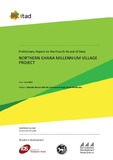| dc.contributor.author | Masset, E | |
| dc.contributor.author | Garcia-Hombrados, J | |
| dc.coverage.spatial | Ghana | en |
| dc.date.accessioned | 2017-07-04T08:59:46Z | |
| dc.date.available | 2017-07-04T08:59:46Z | |
| dc.date.issued | 2017-06 | |
| dc.identifier.citation | Masset, E. with Garcia-Hombrados, J. (2017) Northern Ghana Millennium Villages Impact Evaluation: Preliminary Report on the Fourth Round of Data, Hove: IDS and Itad | en |
| dc.identifier.uri | https://opendocs.ids.ac.uk/opendocs/handle/20.500.12413/13038 | |
| dc.description.abstract | The Millennium Villages Project (MVP) has been designed to demonstrate how an integrated approach to community-led development can translate the international Millennium Development Goals into results. The project in northern Ghana is one of several projects instigated over the past 10 years, which together are set to reach nearly half a million people across 10 countries in Africa.
In 2011, the UK Department for International Development commissioned an impact evaluation of the MVP in northern Ghana. The original design foresaw three rounds of data collection: baseline (2012), midline (2014) and endline (2016). In response to discussions with the Peer Review Group, two smaller household survey rounds were later added to the design for the “interim” years (2013, 2015). These additional rounds focus on a subset of modules such as demographics, consumption and expenditure – and allow the evaluation team to achieve greater statistical power for these variables in order to detect relatively small effects of the intervention (Brown et al., 2013). The baseline data was collected in 2012 and the midterm data in 2014, and include an analysis of the full dataset alongside qualitative assessments (Masset et al., 2014 and Masset et al., 2016).
This report summarises the fourth year of data collection undertaken in 2015. The scope of this report is more limited than the Baseline and Midterm Reports given the data collection during the interim years, but similar to 2013. The fourth survey round collects a reduced set of information at all levels (households, individuals and villages) and there is no qualitative follow-up. The findings presented here focus only on those key variables that are covered across all four rounds of data collection. | en |
| dc.language.iso | en | en |
| dc.publisher | Institute of Development Studies and Itad | en |
| dc.rights.uri | http://www.ids.ac.uk/files/dmfile/IDSOpenDocsStandardTermsOfUse.pdf | en |
| dc.subject | Development Policy | en |
| dc.subject | Evaluation | en |
| dc.subject | Millennium Development Goals | en |
| dc.title | Northern Ghana Millennium Villages Impact Evaluation: Preliminary Report on the Fourth Round of Data | en |
| dc.type | Series paper (non-IDS) | en |
| dc.rights.holder | Itad and IDS | en |
| dc.identifier.team | Imapct and Learning Team | en |
| rioxxterms.funder | Default funder | en |
| rioxxterms.identifier.project | Default project | en |
| rioxxterms.version | VoR | en |
| rioxxterms.funder.project | 9ce4e4dc-26e9-4d78-96e9-15e4dcac0642 | en |

